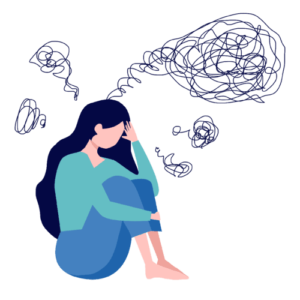
Anxiety Test
Answer these simple questions to understand more about your Anxiety. We share instant results and keep your information confidential.

What is Anxiety Test?
Anxiety assessment is a process used to evaluate an individual’s level of anxiety and its impact on their daily life. It typically involves questionnaires, interviews, and psychological assessments to identify symptoms, triggers, and severity of anxiety-related disorders. The assessment helps professionals diagnose and tailor appropriate treatment plans, such as therapy or medication, to manage anxiety effectively. The goal is to provide personalized support and intervention to improve the individual’s overall well-being and quality of life.
Who can benefit from this Anxiety Test?
Anyone experiencing symptoms of anxiety or related issues can benefit from anxiety assessment. This includes individuals who are feeling excessive worry, fear, or nervousness, and those facing physical manifestations like rapid heart rate, sweating, or trembling. People struggling with specific anxiety disorders, such as generalized anxiety disorder, social anxiety disorder, or panic disorder, can also benefit. The assessment helps identify the severity of the condition and assists healthcare professionals in tailoring appropriate treatments, providing much-needed support to enhance the individual’s emotional and mental well-being.


Anxiety Test Accuracy
The accuracy of anxiety assessments can vary depending on the methods used and the expertise of the assessors. Generally, well-designed assessments, such as standardized questionnaires and clinical interviews conducted by trained professionals, can provide reliable and valid results. However, self-report measures may be influenced by subjective factors, leading to some degree of inaccuracy. It is crucial to consider the context and individual differences when interpreting the results. Despite potential limitations, anxiety assessments remain valuable tools in identifying and understanding anxiety-related issues, guiding appropriate interventions and support.
Types of Anxiety Test
Generalized Anxiety Disorder 7:
A widely used self-report questionnaire to assess the severity of generalized anxiety symptoms based on responses to seven questions.
Beck Anxiety Inventory (BAI):
A self-report scale measuring the severity of anxiety symptoms, helping to identify anxiety levels and monitor treatment progress.
Hamilton Anxiety Rating Scale:
A clinician-administered tool to evaluate anxiety severity by assessing both psychological and physical symptoms.
Anxiety Sensitivity Index (ASI):
A self-report scale measuring fear of anxiety-related symptoms, helping to understand and manage anxiety reactions.
Social Phobia Inventory (SPIN):
A questionnaire assessing symptoms specific to social anxiety disorder, aiding in diagnosis and treatment planning.
Panic Disorder Severity Scale (PDSS):
A clinician-administered scale used to assess the severity of symptoms in individuals with panic disorder.
Handling Anxiety Issues
Handling anxiety issues involves a multifaceted approach that addresses the root causes and provides practical coping strategies. Here are some helpful steps:
- Seek Professional Help: Consult a mental health professional for an accurate diagnosis and personalized treatment plan, which may include therapy and/or medication.
- Practice Relaxation Techniques: Engage in deep breathing, meditation, yoga, or progressive muscle relaxation to reduce stress and promote relaxation.
- Stay Physically Active: Regular exercise can alleviate anxiety by releasing endorphins and improving overall well-being.
- Limit Stimulants: Reduce or avoid substances like caffeine, alcohol, and nicotine, which can exacerbate anxiety symptoms.
- Maintain a Healthy Lifestyle: Prioritize a balanced diet, sufficient sleep, and a routine to support emotional stability.
- Challenge Negative Thoughts: Use cognitive-behavioral techniques to identify and reframe anxious thoughts into more realistic and positive ones.
- Set Realistic Goals: Avoid overwhelming yourself by setting achievable objectives and breaking tasks into smaller steps.
- Practice Mindfulness: Stay present in the moment and cultivate acceptance, reducing worry about the past or future.
- Social Support: Connect with friends, family, or support groups to share feelings and receive understanding and encouragement.
- Limit News and Media Exposure: Limit exposure to distressing news and content that can trigger anxiety.
- Establish Healthy Boundaries: Learn to say no to excessive commitments and responsibilities that can lead to overwhelm.
Remember that coping with anxiety is an ongoing process, and it’s essential to be patient and compassionate with yourself as you work towards managing and reducing anxiety levels.